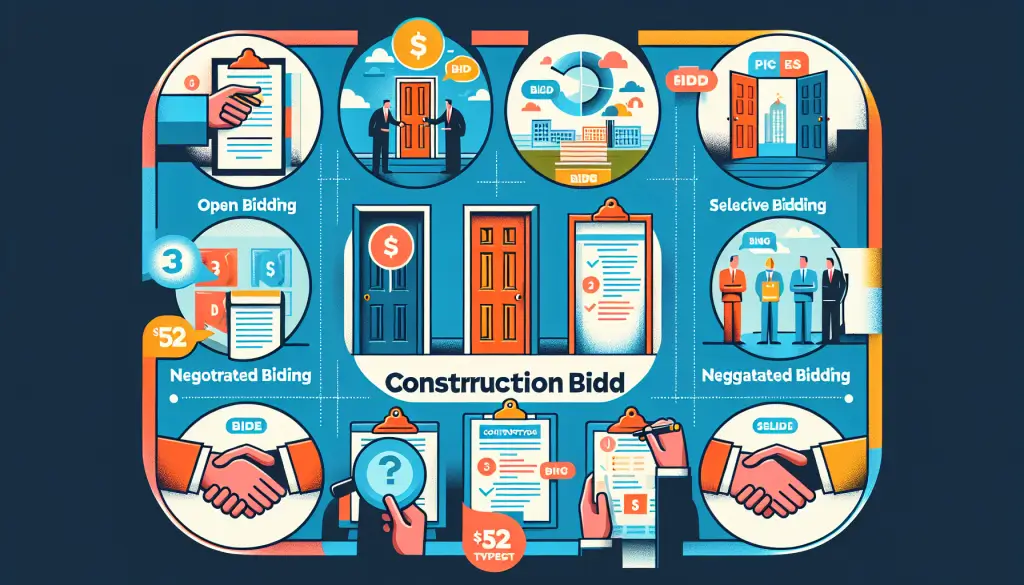15 Essential Construction Company Roles & Their Responsibilities
September 23, 2024
A bid in construction is a formal proposal by contractors aiming to secure projects. Want to boost your chances of winning contracts? This article will walk you through the essentials of construction bidding and share strategies to enhance your bids. From key terms to the bidding process, let’s dive into how you can stand out.

The process of construction bidding is essential for securing new projects within the construction sector. It involves project owners soliciting bids from various contractors or construction companies, who then detail their price quotations, project timelines, and work specifications in their submissions. This method is vital for growing a contractor’s range of projects and acquiring new contracts since it provides an opportunity to demonstrate expertise while seeking out fresh employment opportunities in construction. Effectively managing the intricacies of this process requires astute strategic understanding, clear communication channels, and accurate cost projections.
In the realm of the construction industry, decision-making about contract awards can be heavily influenced by well-established relationships. Building a robust network that enhances brand visibility among peers increases access to more bidding chances—an invaluable asset for any aspiring contractor or established company.
For those operating as contractors in this sphere, comprehending what entails effective participation in the world of demolition planning is imperative including all associated jargon, something they cannot afford to ignore if they wish to flourish.
The process of construction bidding involves contractors submitting formal proposals to complete a construction project, detailing the proposed cost, schedule, and work scope. Clients utilize this bidding process to assess various contractors and choose one that most closely aligns with their requirements. Through evaluation of aspects such as price point, contractor reputation, and previous experience offered in these bids, clients can make an informed selection.
Under strict conditions including definitive work boundaries, comprehensive plans, and specific guidelines are where typically construction bids are lodged by the builders. The precision of these bid estimates is paramount because they affect how competitive a given bid will be in relation to others while also influencing the odds of winning over said project.
Contractors who adeptly modify their bids according to shifts in both client expectations and scopes may distinguish themselves within the competition throughout the building’s lifecycle during its auctioning phase—demonstrating adaptability which could lead them towards success over rivals vying for similar opportunities.
It’s crucial to grasp the essential terms in construction bidding for a smooth journey through the process. Key phrases include ‘solicitation,’ which is an invitation for contractors to submit their proposals, and ‘bid-hit ratio’ – a metric that measures how successful a contractor has been in securing contracts compared to their number of bids.
There can be confusion among similar concepts such as construction bids, proposals, quotes, and estimates. Each plays its unique role within the overall bidding process. A clear comprehension of these differences improves transparency and interaction throughout this phase.

Various project requirements and client inclinations are met by different types of construction bids. Open bidding, selective bidding, and negotiated bidding stand as the main categories, each with distinctive benefits and factors to consider.
Selecting an appropriate bid type can profoundly impact the final result of a construction project. Considerations such as project specifications, scale, and intricacy must be properly catered to.
Open bidding, or open tendering, is a method where any contractor can submit a proposal, promoting transparency and competition.
This format, commonly used in public construction projects, ensures the bidding process remains fair and open to all qualified contractors.
Open bids are evaluated based on various factors, including:
This competitive environment often leads to more construction bids, encouraging contractors to present their best offers.
While open bidding fosters competition, it can also result in many submissions, making the evaluation process time-consuming for project owners. Despite this, the transparency and inclusivity of open bidding make it a preferred choice for many public projects. Contracts are awarded to the contractor who presents the most favorable terms, balancing cost-effectiveness with quality and reliability.
Inviting a limited number of pre-screened contractors to submit bids, selective bidding fosters competitive pricing and procedural ease. By narrowing down participants to those who have demonstrated their competence, this approach enhances the quality of bid submissions during the evaluation process.
This strategy proves especially valuable for intricate projects that require specialized expertise and experience from contractors.
In negotiated bidding, the project owner directly engages in discussions with a selected general contractor, typically for projects that possess distinctive specifications. This method promotes enhanced adaptability and cooperation, facilitating a tight match between the contractor’s proficiency and the specific demands of the project.
This technique is particularly beneficial for specialized projects where conventional competitive bidding might not be appropriate due to their unique nature.

The construction bidding process follows a methodical series of steps that aim to address the needs of the project owner while ensuring an equitable competitive environment for contractors.
The sequence typically comprises five principal phases.
It’s essential to be well-versed with each phase in order to successfully maneuver through the intricacies involved in construction bidding, thus enhancing one’s likelihood of securing contracts.
From precisely calculating potential costs associated with projects to grasping both delivery methods and stakeholder roles, every aspect of this process demands meticulous consideration. Detailed insights into each part will follow in subsequent sections covering all stages linked with construction bid solicitation and contract formation.
The bid solicitation stage initiates the bidding process, wherein project owners extend an invitation for bids to interested contractors who meet certain qualifications. To facilitate this phase, essential documents such as Invitations for Bid (IFB), Requests for Quote (RFQ), and Requests for Proposal (RFP) are distributed to provide comprehensive information about the project. These crucial papers detail the scope of work, technical specifications, and stipulations that need to be met by contractors to draft their proposals accurately.
To document distribution during bid solicitation, prospective bidders have the opportunity through pre-bid site visits to examine the location where work is expected to occur—permitting them a chance at firsthand evaluation regarding dimensions and any existing structures. A component of this initial phase involves contractor prequalification which serves as a filter guaranteeing only those with proven capabilities put forward offers—thereby preserving faith in both sides’ commitment towards successful execution while easing future steps when it comes time to evaluate submissions made by interested parties.
During the crucial stage of bid preparation, contractors carefully evaluate project needs, calculate cost projections, and devise their strategic plans. Once a solicitation is received, they gauge their level of engagement and initiate an in-depth analysis of specifications and plans to forecast the expenses involved accurately. This precise assessment encompasses projected costs for materials, workforce, and subcontractor services to ensure that the tender is both cost-effective for clients and fiscally beneficial for them.
The use of advanced project management software offers substantial improvements in predicting financial requirements with greater precision, which aids contractors in setting forth clear budgets as well as efficiently allocating resources while drafting timelines. By employing this systematic method, the caliber of proposals submitted by contractors visibly increases demonstrating thoroughness along with professional acumen. Consequently, enhancing their prospects for securing contracts.
During the phase of bid submission, contractors are required to present a detailed bid proposal that encompasses plans, schedules, and financial estimates in response to an RFP. Contractors typically put forth their bids accompanied by an outlined schedule for completion of the project, a comprehensive cost analysis, and proof of their professional qualifications to affirm their competence and dependability. Before engaging in formal submission of the bid, meticulous preparation of quotations ensures thoroughness and accuracy.
To assure the project owner that they will complete the work according to what was proposed in their bid – A guarantee often fulfilled through acquiring a bid bond may be necessary for contractors. All details must be reviewed scrupulously within submissions so as not to overlook any errors that could compromise success during the selection process.
The process of bid evaluation and selection entails scrutinizing all the bids received to identify which one most effectively aligns with what the project owner is looking for.
In doing so, a range of crucial aspects are taken into account.
Clients frequently go rather than simply choosing the cheapest offer. They look at economic considerations like average value and discard outliers from consideration to facilitate an impartial assessment method.
It’s essential for contractors submitting bids that their proposals strike a balance between being economically attractive and still yielding profit. They must navigate cost-efficiency against delivering high standards as well as dependability. Contractor history, along with safety records, are pivotal elements influencing decision-making since clients aim to reduce uncertainties and guarantee the effective completion of their projects.
Upon acceptance of a bid, the contractor who has been chosen and the project owner proceed to hammer out the specifics within the construction contract. This stage is dedicated to negotiating conditions, refining details about the project, and confirming that there is mutual understanding regarding anticipations and duties between both parties. Addressing any issues with the client after their bid submission can help resolve uncertainties and cement contractual terms.
Ensuring clarity throughout contract formation helps avert misapprehensions, laying the groundwork for an orderly commencement of work. The completed construction agreement serves as a legally enforceable document that delineates aspects such as scope of work, schedule milestones, and financial commitments, among other essential elements that steer all involved towards efficient completion of said project.

A winning construction bid incorporates various crucial components that illustrate the project’s details and demonstrate the contractor’s proficiency. These vital aspects, such as the scope of work, cost estimates, and project schedule, are instrumental in ensuring that a bid is thorough and stands out in the competition.
Skillfully showcasing these factors can markedly elevate a bid’s appeal to those who own the projects.
A thorough outline of the project’s deliverables, which encompasses materials, labor, and schedules, is encapsulated in the scope of work. This precise definition mitigates misunderstandings and establishes explicit benchmarks for performance.
Early dissemination of this data aligns all involved entities regarding project details, thus minimizing potential obstacles and confusion.
For a construction bid to be successful and not result in financial losses upon acceptance, it is imperative that contractors produce precise cost estimates. To stay competitive, they need to meticulously evaluate expenses related to labor rates, material costs, and subcontractor fees.
To offer a viable and thorough economic forecast for the endeavor at hand, an exhaustive cost estimate must encompass aspects such as labor, materials, equipment utilization rates, and overheads.
A project schedule that is thoughtfully crafted delineates critical benchmarks and timeframes for every stage of the construction project. Such a schedule facilitates task organization, pinpoints inter-task dependencies, and assists in efficient resource distribution.
Utilizing tools such as digital graph charts and templates tailored to construction scheduling can simplify the planning stage. These resources enhance the appeal of a bid to prospective clients by presenting an unambiguous roadmap leading to the fulfillment of the project.

Adopting top-notch strategies for construction bidding can boost productivity, ensure economical project planning, and improve the likelihood of securing projects. A winning bid is usually the result of detailed research, precise communication, and the utilization of advanced technology.
These methodologies enhance bid proposals and foster trustworthiness with potential clients. The following are some detailed best practices in this area.
Effective bidding is built on the foundation of meticulous research. It’s essential to have a deep understanding of what the client wants, the specifics of the project, and any limitations regarding finances before submitting a bid. Attending pre-bid meetings can be highly beneficial as they provide an opportunity for contractors to inquire. And obtain clarity about project financing. Ensuring that bids are priced competitively yet accurately hinges on having current knowledge of costs related to crucial components such as materials and machinery.
Engaging with industry professionals through trade associations helps in staying abreast of peer strategies while keeping an eye on competitive undertakings. These interactions pave the way for acquiring greater insights into what clients look for in projects and how one can meet those expectations more effectively within their bids. By showcasing attributes like collective team expertise and referencing previously accomplished successful ventures, contractors may elevate their proposals above others, even when theirs isn’t necessarily reflecting the lowest cost proposal.
It is crucial to ensure that communication with the client remains transparent and consistent during the bidding process. By providing frequent updates and offering a clear breakdown of the bid components, you foster both comprehension and confidence.
Presenting an itemized list of information within the bid along with comprehensive justifications for each component, helps set proper expectations and diminishes potential confusion, thus facilitating a more efficient bidding process.
The implementation of technology has the potential to refine the construction bidding process, ensuring bid precision. Websites dedicated to construction bidding, including BidClerk, GovernmentBids, and PlanHub, play a crucial role in connecting contractors with upcoming projects while offering essential resources and leads for success. The use of cloud-based solutions for document storage Facilitates teamwork through simplified access to critical documentation.
With mobile applications tailored for bidding purposes on hand, instant updates can be shared, and communication with clientele is more direct—this contributes substantially to workflow productivity enhancements. Specialized software designed for estimating construction costs aids in significantly elevating both accuracy and efficiency within bids which helps them stand out as more competitive in nature. Tools provided by platforms like Constructconnect® are instrumental due to their takeoff software capabilities coupled with project management resources that smooth out intricacies involved in the bidding process.
Employing such technological advancements assures that all submitted bids are thoroughly researched, and precise down to detail thereby making them robustly persuasive.
Deux Project Limited excels in the realm of construction bidding, leveraging its vast experience spanning more than three decades and providing full-scale management services. This premier construction company is distinguished by its ability to manage intricate bids effectively and ensure the completion of projects with success due to robust training programs and development initiatives.
Key elements that underpin their superior performance in construction bidding are detailed in subsequent sections.
Showcasing experience and expertise builds trust with potential clients. Deux Project Limited has a rich history of successfully completing projects in diverse sectors, including construction, oil and gas, social infrastructure, government projects, and private projects. Highlighting relevant past projects and similar work significantly enhances bidding credibility and demonstrates the company’s capability to handle complex projects.
Maintaining a database of contractors and establishing strong relationships is another critical aspect of Deux Project’s success. This approach ensures that the company can quickly reference potential leads and build a reliable network of trusted partners. The combination of demonstrated expertise and well-maintained contractor relationships greatly impacts the success of their construction bids.
Providing full-scope management services sets Deux Project apart in their proposals, successfully satisfying the demands of clients. They deliver complete, end-to-end solutions that facilitate efficient project delivery, reducing client participation during implementation and guaranteeing effective operation and maintenance for the entire duration of the project.
Adopting this all-encompassing strategy enhances the attractiveness of their proposals since clients have confidence that their projects will be expertly handled from inception to completion.
The cultivation of expertise in project management and safety is pivotal for the Deux Project team to maintain exceptional performance standards. By dispensing targeted training in areas such as project management methodologies, compliance with safety norms, and specialized technical proficiencies, the company arms its workforce with vital competencies required for its professional success. To ensure they remain at the forefront of industry developments, practical training sessions and educational workshops are routinely held.
Deux Project has instituted a systematic process for evaluating and providing feedback on its training initiatives to promote a progressive learning environment. This dedication to continual skill enhancement positions Deux Project favorably within the construction bidding sphere by facilitating consistent delivery of superior projects that bolster their competitive edge during the construction bidding process.
If you are looking to start a large-scale construction project and are looking for a trusted company with years of experience, be sure to contact Deux Project Limited.
A contractor presents a construction bid as an official document detailing the scope of work, cost estimates, and projected timeline for completing a construction project.
This bid plays a vital role in guiding clients and contractors through their decision-making process concerning the project.
Understanding the primary forms of construction bids, such as open bidding, selective bidding, and negotiated bidding, is crucial to selecting the most suitable method for your project.
Accurate cost estimation is essential in construction bidding as it ensures the bid remains competitive while also covering all necessary costs, enabling profitability. This not only secures projects but also fosters financial stability for ongoing operations.
Utilizing construction bidding websites, cloud-based document storage, and estimating software can greatly improve the efficiency of the construction bidding process. This integration of technology not only expedites workflows but also enhances precision in project management.
These technological advancements contribute to significant time savings as well as bolstered efficiency throughout the entire construction bidding process.
With a wealth of experience under its belt, Deux Project Limited stands out in the construction bidding process. This is bolstered by their all-encompassing management services along with robust training and development initiatives.
This synergy guarantees that they possess the necessary capabilities to handle project requirements efficiently.
September 23, 2024
September 18, 2024
August 26, 2024